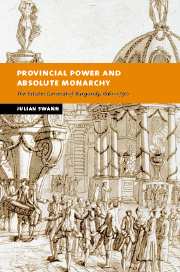Book contents
- Frontmatter
- Contents
- List of illustrations
- List of figures
- List of appendices
- List of map
- Preface
- List of abbreviations
- Map: The duchy of Burgundy in the eighteenth century
- 1 Historians, absolute monarchy and the provincial estates
- 2 Ancien régime Burgundy
- 3 The Estates General of Burgundy
- 4 Nosseigneurs les élus and the officers of the Estates
- 5 The provincial administration: authority and enforcement
- 6 ‘It's raining taxes’. Paying for the Sun King, 1661–1715
- 7 Provincial administration in an age of iron, 1661–1715
- 8 The limits of absolutism: crown, governor and the Estates in the eighteenth century
- 9 Provincial rivalries: the Estates and the Parlement of Dijon in the eighteenth century
- 10 Tax, borrow and lend: crown, Estates and finance, 1715–1789
- 11 An enlightened administration?
- 12 The coming of the French revolution in Burgundy, 1787–1789
- Conclusion
- Appendices
- Bibliography
- Index
6 - ‘It's raining taxes’. Paying for the Sun King, 1661–1715
Published online by Cambridge University Press: 05 July 2009
- Frontmatter
- Contents
- List of illustrations
- List of figures
- List of appendices
- List of map
- Preface
- List of abbreviations
- Map: The duchy of Burgundy in the eighteenth century
- 1 Historians, absolute monarchy and the provincial estates
- 2 Ancien régime Burgundy
- 3 The Estates General of Burgundy
- 4 Nosseigneurs les élus and the officers of the Estates
- 5 The provincial administration: authority and enforcement
- 6 ‘It's raining taxes’. Paying for the Sun King, 1661–1715
- 7 Provincial administration in an age of iron, 1661–1715
- 8 The limits of absolutism: crown, governor and the Estates in the eighteenth century
- 9 Provincial rivalries: the Estates and the Parlement of Dijon in the eighteenth century
- 10 Tax, borrow and lend: crown, Estates and finance, 1715–1789
- 11 An enlightened administration?
- 12 The coming of the French revolution in Burgundy, 1787–1789
- Conclusion
- Appendices
- Bibliography
- Index
Summary
In the course of his long literary correspondence with his friend Soyrot, the Burgundian savant, Bernard de La Monnoye, paused to reflect upon the inclement state of natural and human affairs. He wrote:
to the devil with the war which brings us so many taxes, the year, as you know, has been extremely wet, the rain has finally ceased, it is only the taxes that never end and keep falling still.
His letter was written in 1689, and although he could not have foreseen it the fiscal precipitations of the first half of Louis XIV's reign had been no more than an unpleasant shower, the second half would bring a deluge. In the autumn of 1688, the aggressive policies of the Sun King plunged France into the ruinous War of the League of Augsburg (1688–97), against what would prove to be a powerful coalition of European states. After nine years of fighting, for little apparent gain, the peace of Ryswick offered an exhausted kingdom the much-needed prospect of peace. The death of the childless Charles II of Spain in 1700, and the dying monarch's decision to bequeath his throne to Louis XIV's grandson, dashed those hopes. By accepting the will, the French king committed his people to the no less costly War of the Spanish Succession (1701–13), which by 1709 had brought France close to collapse and foreign invasion.
- Type
- Chapter
- Information
- Provincial Power and Absolute MonarchyThe Estates General of Burgundy, 1661–1790, pp. 154 - 193Publisher: Cambridge University PressPrint publication year: 2003



